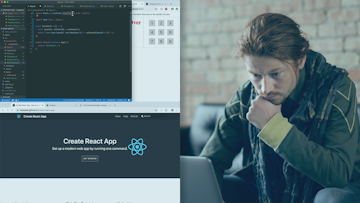
Building efficient web and mobile interfaces is often challenging and requires the use of imperative logic. React enables you to declaratively describe user interfaces in terms of their state, and it will do the heavy lifting of natively building them for you. In this course, React: Getting Started, you will delve into the fundamental concepts about React and use them to build practical web applications. First, you will see how to design class components and stateful function component, how to one-way flow data and behavior in a component tree, and how to read and update state elements. Then, you will delve into modern JavaScript...
Read more
Good to know
Save this course
Activities
Career center
Frontend Developer
Web Developer
Full-Stack Developer
JavaScript Developer
Software Engineer
Mobile Developer
User Interface (UI) Designer
Software Architect
Computer Programmer
Product Manager
Technical Writer
Data Scientist
Project Manager
Business Analyst
Marketing Manager
Reading list
Share
Similar courses
OpenCourser helps millions of learners each year. People visit us to learn workspace skills, ace their exams, and nurture their curiosity.
Our extensive catalog contains over 50,000 courses and twice as many books. Browse by search, by topic, or even by career interests. We'll match you to the right resources quickly.
Find this site helpful? Tell a friend about us.
We're supported by our community of learners. When you purchase or subscribe to courses and programs or purchase books, we may earn a commission from our partners.
Your purchases help us maintain our catalog and keep our servers humming without ads.
Thank you for supporting OpenCourser.


